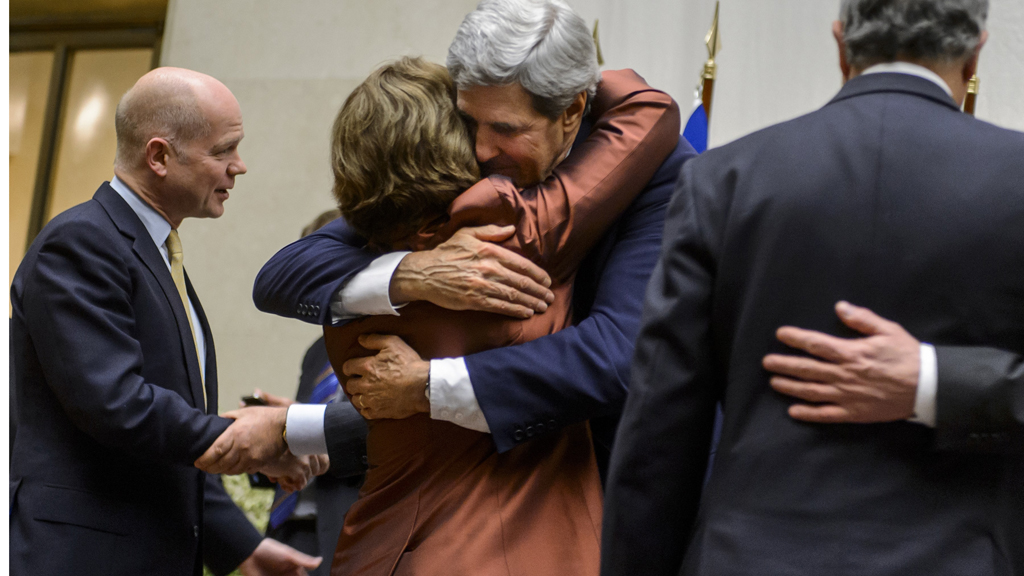Hague: ‘We should take heart from this deal’
Foreign Secretary William Hague says a deal struck with Iran over its nuclear programme has made the world a safer place, and it is now time to test Tehran’s “readiness to act in good faith”.

Setting out the terms of the deal between Iran and six world powers, Mr Hague said that although in its early stages, “the fact we have achieved for the first time in nearly a decade an agreement that halts and rolls back Iran’s nuclear programme should give us heart that this work can be done and that a comprehensive agreement can be attained”.
In an apparent reference to critics, including Israel and members of the US Congress, he added: “On an issue of such complexity and given the fact to make any diplomatic agreement worthwhile to both sides it has to involve compromises, such an agreement is bound to have its critics and opponents.
“But we are right to test to the full Iran’s readiness to act in good faith, to work with the rest of the international community and to enter into international agreements….[if we did not] then we ourselves would be guilty of a grave error”.
The deal, agreed between Iran and the P5+1 group of nations – the US, France, Germany, Britain, China and Russia – in Geneva in the early hours of Sunday morning, said that Iran would curb its nuclear programme in exchange for initial sanctions relief.
Israel has been strongly opposed to the agreement, insisting that it is an “historic mistake”. Binyamin Netanyahu, Israel’s prime minister, has announced that an Israeli team led by Yossie Cohen, the national security adviser, will travel to Washington for talks.
Some US politicians have also said that they are unhappy with the agreement, amid scepticism as to whether Iran would stick to it.
Iranian President Hassan Rouhani has said that the deal seals Iran’s “nuclear rights”.
‘Only a beginning’
While Mr Hague conceded that the agreement was “only a beginning”, he said it was “a significant step towards enhancing the security and safety of the Middle East, preventing nuclear proliferation worldwide.”
He added that Britain would be “on its guard” amid concerns expressed by the former Liberal Democrat leader Sir Menzies Campbell that Israel may try to disrupt the process.
Facilitated by the European Union, the agreement halts the nation’s most sensitive nuclear activity, its higher grade enrichment of uranium, in return for about £4.3bn ($7bn) in sanctions relief.
Under the terms of the agreement, in which EU foreign policy chief Catherine Ashton played a key role, Iran has agreed to stop uranium enrichment beyond 5 per cent, and has said it will neutralise its stockpile of near 20 per cent uranium.
It has also agreed to stop enriching capabilities at the Arak heavy water reactor, and the International Atomic Energy Agency will monitor whether Iran is carrying out its promises.
In return, sanctions could be partially lifted as soon as December, Laurent Fabius, France’s foreign minister, said.
Key points of the deal:
-
Iran commits to halting uranium enrichment beyond 5 per cent
-
Iran commits to neutralising its stockpile of near 20 per cent uranium
-
Iran commits to halt progress on enrichment capacity, including installing new centrifuges
-
Iran commits not to continue building up the Arak reactor
-
In return, the P5+1 will not impose new sanctions for six months, will suspend certain sanctions on gold, cars and petrochemical exports, allowing $1.5bn revenue, relax sanctions on aviation, and allow Iranian oil to continue to be bought at reduced levels
The deal was struck amid long-standing fears that Iran may attempt to use its nuclear weapons to build atomic arms.
Tehran has repeatedly denied that it has military ambitions for its nuclear programme, but at the first round of talks in Geneva earlier in November, France all but vetoed a deal, suggesting that it wanted Iran to go further in limiting its nuclear capability.
Mr Fabius said that France was now pleased with what Iran had agreed.
“This lifting is partial, targeted and reversible,” he said. “As long as civilian nuclear energy is concerned we agree on that and we already said it. But for a military nuclear energy it’s a no. So that’s clear.”
‘Important step’
China welcomed the deal on Monday, saying it is “an important step forward”.
Foreign Ministry spokesman Qin Gang said at the regular briefing that there are still a lot do do to fulfil this first step.
“Many detailed issues must be solved in order for the first step to hit the ground. Therefore we hope all the relevant parties can be committed to the promises they made and realise their obligations,” said Qin, adding that China will continue to play an important role.
Saudi Arabia previously expressed misgivings over the deal. However, the country’s cabinet said afterwards: “If there was goodwill, this agreement could represent a preliminary step towards a comprehensive solution to the Iranian nuclear programme.”
Qatar and Kuwait have also come out in favour of the deal, saying they hoped it would help to preserve regional stability and security.
US Secretary of State John Kerry said the deal will make the Middle East safer. “Iran’s 20 percent uranium will be destroyed, therefore they are safer. Iran’s 3.5 percent uranium stock will be frozen at its current level, and the centrifuges will not be able to be installed in places they could otherwise be installed and advance the program,” he told American broadcaster ABC.